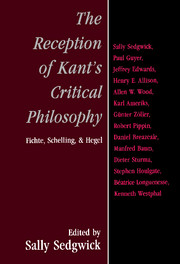Book contents
- Frontmatter
- Contents
- Notes on the Contributors
- Acknowledgments
- Introduction: Idealism from Kant to Hegel
- 1 The Unity of Nature and Freedom: Kant's Conception of the System of Philosophy
- 2 Spinozism, Freedom, and Transcendental Dynamics in Kant's Final System of Transcendental Idealism
- 3 Is the Critique of Judgment “Post-Critical”?
- 4 The “I” as Principle of Practical Philosophy
- 5 The Practical Foundation of Philosophy in Kant, Fichte, and After
- 6 From Critique to Metacritique: Fichte's Transformation of Kant's Transcendental Idealism
- 7 Fichte's Alleged Subjective, Psychological, One-Sided Idealism
- 8 The Spirit of the Wissenschaftslehre
- 9 The Beginnings of Schelling's Philosophy of Nature
- 10 The Nature of Subjectivity: The Critical and Systematic Function of Schelling's Philosophy of Nature
- 11 Substance, Causality, and the Question of Method in Hegel's Science of Logic
- 12 Point of View of Man or Knowledge of God: Kant and Hegel on Concept, Judgment, and Reason
- 13 Kant, Hegel, and the Fate of “the” Intuitive Intellect
- 14 Metaphysics and Morality in Kant and Hegel
- Bibliography
- Index
3 - Is the Critique of Judgment “Post-Critical”?
Published online by Cambridge University Press: 03 December 2009
- Frontmatter
- Contents
- Notes on the Contributors
- Acknowledgments
- Introduction: Idealism from Kant to Hegel
- 1 The Unity of Nature and Freedom: Kant's Conception of the System of Philosophy
- 2 Spinozism, Freedom, and Transcendental Dynamics in Kant's Final System of Transcendental Idealism
- 3 Is the Critique of Judgment “Post-Critical”?
- 4 The “I” as Principle of Practical Philosophy
- 5 The Practical Foundation of Philosophy in Kant, Fichte, and After
- 6 From Critique to Metacritique: Fichte's Transformation of Kant's Transcendental Idealism
- 7 Fichte's Alleged Subjective, Psychological, One-Sided Idealism
- 8 The Spirit of the Wissenschaftslehre
- 9 The Beginnings of Schelling's Philosophy of Nature
- 10 The Nature of Subjectivity: The Critical and Systematic Function of Schelling's Philosophy of Nature
- 11 Substance, Causality, and the Question of Method in Hegel's Science of Logic
- 12 Point of View of Man or Knowledge of God: Kant and Hegel on Concept, Judgment, and Reason
- 13 Kant, Hegel, and the Fate of “the” Intuitive Intellect
- 14 Metaphysics and Morality in Kant and Hegel
- Bibliography
- Index
Summary
Dualism, formalism, subjectivism: These for Hegel constitute the unholy trinity of the Kantian philosophy, the grounds for characterizing it in Glauben und Wissen as a “philosophy of reflection,” as opposed to a speculative philosophy, which is alone capable of doing justice to the nature of reason. In this same work, however, Hegel also claims to find in the third Critique, particularly in the conceptions of reflective judgment and the intuitive understanding, an anticipation of the speculative principle of the identity of subject and object, thought and being. Moreover, this privileging of the third Critique is not merely a passing phase of the young Hegel; for in his later writings he continued to regard the intuitive intellect as a genuine anticipation of the concrete universal and he attributed to it the functions of grounding the purposiveness of nature, the beautiful in art, and the ultimate unity of nature and freedom. To be sure, in spite of his positive appraisal of certain aspects of the Critique of Judgment, Hegel remained highly critical of Kant's procedure in that work as a whole, suggesting that he failed to grasp the implications of his own insights and thus lapsed back into a disastrous subjectivism. Nevertheless, the fact remains that for both the young and the mature Hegel the third Critique was seen as postcritical in essential respects, as pointing the way to a new, more adequate mode of philosophizing.
- Type
- Chapter
- Information
- The Reception of Kant's Critical PhilosophyFichte, Schelling, and Hegel, pp. 78 - 92Publisher: Cambridge University PressPrint publication year: 2000
- 27
- Cited by



